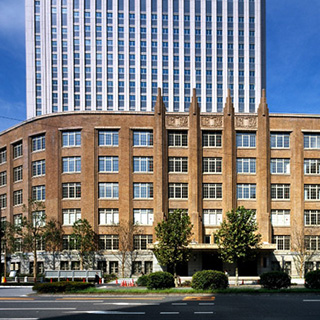Roles of Education for Society in and after 2030
○ On the assumption of considering the educational policy system for society in and after 2030, it is necessary to accept the drastic changes in society mentioned in II. 2. above, to take into account international trends in policies to establish sustainable growth and social development as a goal, including the Sustainable Development Goals (SDGs)(*1), and to define a future model of society and the roles of education in achieving the model.
○ First, the following points will be universally important in the future as the ideal of individuals and society and roles of education for society model in 2030 and after.
- For individuals, it is important to foster human resources who make judgments independently as independent human beings, work together with diversified people, and create new values. We should be independently involved in society in addition to responding to changes, create new values unique to human beings, and be able to create our future. For this reason, it is important to acquire the ability to understand the crux of problems in unforeseeable situations, to put forward questions and aim to resolve them, and to resolve the problem by combining various resources in cooperation with diversified people.
- In terms of society, it is required to achieve a rich and safe society where every single person takes an active role. It is important that every single person of different age, sex, nationality, economic situation, ability, etc. can respect the personalities of others, support each other, live happily and be able to fulfill their roles and responsibilities in society and take active roles. Therefore, it is necessary to aim to achieve a rich and safe society where each person can take an active role by having all people fulfill their possibilities through education.
- In addition, in terms of society, it is also important to achieve sustainable growth and development of society (region, country, world) with a long-term perspective. Under circumstances where the reduction in labor force population is estimated in association with the advancement of the declining birthrate and aging population in addition to changes in the structures of society and industry, it is important for maintaining and increasing the vitality of society to achieve sustainable growth and development of society (region, country, world) with a long-term estimate for the next generation, such as maximizing the competencies of individuals through education while taking over Japanese traditions and cultures and to grow the economy by increasing productivity, etc.
○ In order to achieve the aforementioned models of individuals and society, it is necessary to continue working under the philosophy of aiming to construct a lifelong learning society in order to achieve the three directions, Independence, Collaboration, and Creativity, that was established in the Second Basic Plan, and to strongly engage in educational reform activities.
○ In addition, in terms of future society, responses to the arrival of a period where people live 100 years in association with lifespan extension and the achievement of a Super Smart Society (Society 5.0) are particularly important themes. Based on the above, the government held the Council for Designing the period in which people live 100 years and started activities for the Revolution in Human Resources Development, which is an important key to creating a society where all citizens including from senior citizens to youths have opportunities and can continue playing active roles and a society where people can live safely.
○ In addition, the emergence of new innovations, such as AI, etc., creates totally new values in the Super Smart Society (Society 5.0) and has a big possibility of increasing productivity in a revolutionary manner. The government has been engaging in activities to achieve the first productivity revolution in the world. We are now examining how educational policies are involved in and contribute to the aforementioned movements.
Living Well in a Period Where People Live 100 Years
○ Thanks to the enhancement of medical systems, progress in medical science, and improvement in living level, etc., average longevity has been significantly extended and it is estimated that a period is coming where people will live 100 years. In the future, it will become common to hold two or three jobs in our lives or to engage in activities to resolve issues in the community and society through volunteer activities, etc. while working or after retirement.
○ Under these life cycles, it becomes more necessary for us to keep learning for our entire life, to heighten our abilities, and to lead them to keep working and to engage in activities to resolve issues in the community and society in order to live well in a period where people live 100 years, in addition to acquiring competencies at the stage of youth, including knowledge and skills, abilities to think, make judgement and express oneself and motivation to learn, and humanity, etc.
Living in a Super Smart Society (Society 5.0)
○ In the 5th Science and Technology Basic Plan (Cabinet Decision on January 22, 2016), it was declared to share a model of society where new values are created at every turn and which brings wealth to people by the activity of using ICT at maximum and fusing cyberspace and physical space (actual world), and to achieve the first society in the world.
○ The Super Smart Society (Society 5.0) involves changes in a broad range of industrial structures, including production, distribution, sale, transportation, health, medical treatment, finance, public services, etc., changes to the way people work and their lifestyles, and other changes.
○ In order to survive in a society with these drastic changes, it is essential for every single citizen to acquire the ability to accumulate quality learning over their entire life, grow in each position and field, create new values, and continue to live in a lively manner. In this case, it is also an important issue to acquire basic abilities to use information literacy in order to select necessary information among abundant information and to use technology that keeps advancing.
Maximizing Possibilities and Opportunities for Each Person Through Education
○ Based on the aforementioned, it is required to engage in activities by setting the maximization of possibilities and opportunities of every single person in their entire life as a core issue of future educational policies so that everyone can acquire higher quality abilities than before, polish these abilities, and live with hope for the future in their entire lives and that the achievement of a Super Smart Society (Society 5.0) can bring sustainable development to Japan and the world.
○ We must consider the big turn in society that we are facing as a chance to address issues on a full scale and to resolve the issues that Japan has and we must implement educational policies in national and local governments with a mindset that education will lead these activities.
Achievement of Consistent Education to Maximize Possibilities of Individuals
○ This is an era where it is reported that many jobs will be replaced with computers in the near future due to the development of AI. That is why it becomes more important to foster the ability to cooperate with others, achieve the sensitivity and creativity unique to human beings, and create new values, in addition to fostering the ability to use ICT independently. Future education must emphasize the maximization of the aforementioned possibilities of human beings as a consistent philosophy of lifelong education from early childhood until old age.
○ Concerning elementary and secondary education, competencies to be fostered through early childhood until upper secondary school education are defined in the following three pillars: (i) “What does a student understand and what can a student do (acquisition of Knowledge and Skills which can be utilized in real life contexts); (ii) How to use what a student understands and what a student can do (fostering abilities to think, make judgement and express oneself, etc. with which students can respond to unknown conditions); and (iii) How a student gets involved in society and the world and to live a better life (cultivation of motivation to learn, and humanity, etc. which is an attitude to apply what students learn for their lives and society); and it is required to achieve curricula open to society where the aforementioned competencies are fostered while focusing on contact with society and the world. Therefore, it is important to engage in activities towards achievement of it steadily(*2).
○ Concerning upper secondary school education and higher education, currently concrete activities for the philosophy to maximize possibilities of individuals are implemented as a reform of the connection between upper secondary schools and universities which aims to achieve integral reform between upper secondary school education, university entrance examinations, and university education. This steady achievement is an urgent need. In this case, particularly in university education, under an era with drastic changes, it is necessary to consider the development of wide-ranging and deep liberal arts education without limiting it to specialized fields alone.
○ In addition, in the period where people live 100 years, it is also necessary to enhance recurrent education since it becomes more important to acquire abilities necessary for various stages in our lives and to fulfill them. As mentioned above, it is necessary to achieve education where individuals acquire necessary knowledge and skills throughout their lives as a consistent philosophy from early childhood until old age, to overcome various social changes in cooperation with others, and to maximize their abilities.
Development of Educational Environment to Maximize Individual Opportunities
○ In addition, under circumstances where population decline and an aging population are predicted in Japan, while other countries, including emerging countries, are growing, it is essential to achieve a society where individuals can play active roles in their lifetime in order for Japan to remain competitive and to achieve a sustainable society.
○ It is necessary to develop an environment to maximize chances to take on challenges and major progress of individuals so that everyone can relearn at any age, can try to start new things, and can make efforts to fulfill their dreams regardless of their financial situation at home.
*1 The Sustainable Development Goals, goals related to education, stipulate Goal 4 as an educational goal that “Ensures inclusive and equitable quality education and promotes lifelong learning opportunities for all.”
*2 The new National Curriculum Standard corrected education programs with the aim of fostering qualifications and abilities required so that every single person becomes a creator of the future in an era where it is difficult to estimate the future and builds a better life and better society. (Public Notice of the Ministry of Education, Culture, Sports, Science and Technology No. 62, No. 63, and No.64, 2017; and Public Notice of the Ministry of Education, Culture, Sports, Science and Technology No. 68, 2018)
(Education Policy Bureau Policy Division)




